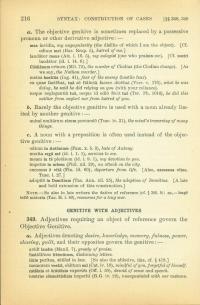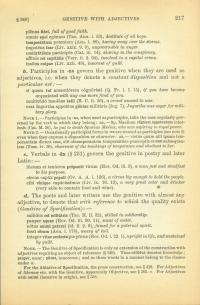349. Adjectives requiring an object of reference govern the Objective Genitive.
a. Adjectives denoting desire, knowledge, memory, fullness, power, sharing, guilt, and their opposites govern the genitive.
avidī laudis (Manil. 7)
greedy of praise
fastīdiōsus litterārum
disdaining letters
iūris perītus
skilled in law
[So also the ablative, iūre, cf. § 418]
memorem vestrī, oblītum suī (Cat. 4.19)
mindful of you, forgetful of himself
ratiōnis et ōrātiōnis expertēs (Off. 1.50)
devoid of sense and speech
nostrae cōnsuētūdinis imperītī (B. G. 4.22)
unacquainted with our customs
plēnus fideī
full of good faith
omnis speī egēnam (Tac. Ann. 1.53)
destitute of all hope
tempestātum potentem (Aen. 1.80)
having sway over the storms
impotēns īrae (Liv. 29.9.9)
ungovernable in anger
coniūrātiōnis participēs (Cat. 3.14)
sharing in the conspiracy
affīnis reī capitālis (Verr. 2.2.94)
involved in a capital crime
īnsōns culpae (Liv. 22.49)
innocent of guilt
b. Participles in -ns govern the genitive when they are used as adjectives, i.e. when they denote a constant disposition and not a particular act.
sī quem tuī amantiōrem cōgnōvistī (Q. Fr. 1.1.15)
if you have become acquainted with any one more fond of you
multitūdō īnsolēns bellī (B. C. 2.36)
a crowd unused to war
Erat Iugurtha appetēns glōriae mīlitāris (Iug. 7)
Jugurtha was eager for military glory.
Note 1— Participles in -ns, when used as participles, take the case regularly governed by the verb to which they belong.
Sp. Maelium rēgnum appetentem interēmit (Cat. M. 56)
He put to death Spurius Mælius, who was aspiring to royal power.
Note 2— Occasionally participial forms in -ns are treated as participles (see note 1) even when they express a disposition or character.
virtūs quam aliī ipsam temperantiam dīcunt esse, aliī obtemperantem temperantiae praeceptīs et eam subsequentem (Tusc. 4.30)
observant of the teachings of temperance and obedient to her
c. Verbals in -āx (§ 251) govern the genitive in poetry and later Latin.
iūstum et tenācem prōpositī virum (Hor. Od. 3.3)
a man just and steadfast to his purpose
circus capāx populī (Ov. A. A. 1.136)
a circus big enough to hold the people
cibī vīnīque capācissimus (Liv. 9.16.13)
a very great eater and drinker (very able to contain food and wine)
d. The poets and later writers use the genitive with almost any adjective, to denote that with reference to which the quality exists (Genitive of Specification).
callidus reī mīlitāris (Tac. H. 2.32)
skilled in soldiership
pauper aquae (Hor. Od. 3.30.11)
scant of water
nōtus animī paternī (id. 2.2.6)
famed for a paternal spirit
fessī rērum (Aen. 1.178)
weary of toil
integer vītae scelerisque pūrus (Hor. Od. 1.22.1)
upright in life, and unstained by guilt
Note— The Genitive of Specification is only an extension of the construction with adjectives requiring an object of reference (§ 349). Thus callidus denotes knowledge; pauper, want; pūrus, innocence; and so these words in a manner belong to the classes under a.
For the Ablative of Specification, the prose construction, see § 418. For adjectives of likeness etc. with the genitive, apparently objective, see § 385.c. For adjectives with animī (locative in origin), see § 358.


